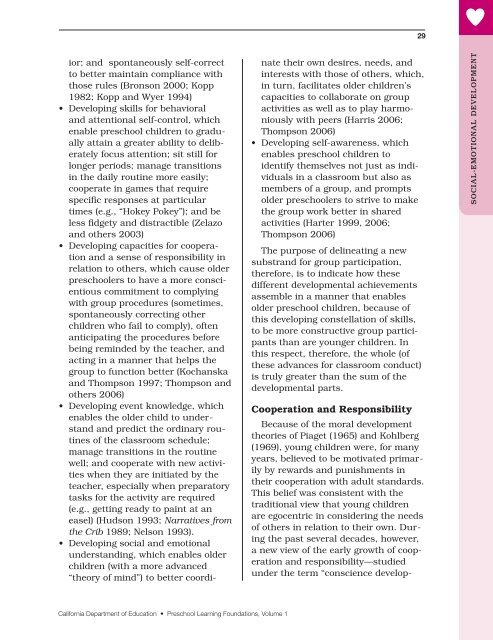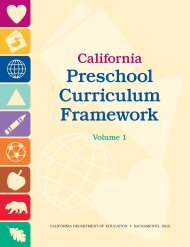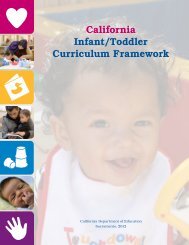California Preschool Learning Foundations - ECEZero2Three ...
California Preschool Learning Foundations - ECEZero2Three ...
California Preschool Learning Foundations - ECEZero2Three ...
You also want an ePaper? Increase the reach of your titles
YUMPU automatically turns print PDFs into web optimized ePapers that Google loves.
ior; and spontaneously self-correct<br />
to better maintain compliance with<br />
those rules (Bronson 2000; Kopp<br />
1982; Kopp and Wyer 1994)<br />
• Developing skills for behavioral<br />
and attentional self-control, which<br />
enable preschool children to gradually<br />
attain a greater ability to deliberately<br />
focus attention; sit still for<br />
longer periods; manage transitions<br />
in the daily routine more easily;<br />
cooperate in games that require<br />
specific responses at particular<br />
times (e.g., “Hokey Pokey”); and be<br />
less fidgety and distractible (Zelazo<br />
and others 2003)<br />
• Developing capacities for cooperation<br />
and a sense of responsibility in<br />
relation to others, which cause older<br />
preschoolers to have a more conscientious<br />
commitment to complying<br />
with group procedures (sometimes,<br />
spontaneously correcting other<br />
children who fail to comply), often<br />
anticipating the procedures before<br />
being reminded by the teacher, and<br />
acting in a manner that helps the<br />
group to function better (Kochanska<br />
and Thompson 1997; Thompson and<br />
others 2006)<br />
• Developing event knowledge, which<br />
enables the older child to understand<br />
and predict the ordinary routines<br />
of the classroom schedule;<br />
manage transitions in the routine<br />
well; and cooperate with new activities<br />
when they are initiated by the<br />
teacher, especially when preparatory<br />
tasks for the activity are required<br />
(e.g., getting ready to paint at an<br />
easel) (Hudson 1993; Narratives from<br />
the Crib 1989; Nelson 1993).<br />
• Developing social and emotional<br />
understanding, which enables older<br />
children (with a more advanced<br />
“theory of mind”) to better coordi-<br />
<strong>California</strong> Department of Education • <strong>Preschool</strong> <strong>Learning</strong> <strong>Foundations</strong>, Volume 1<br />
nate their own desires, needs, and<br />
interests with those of others, which,<br />
in turn, facilitates older children’s<br />
capacities to collaborate on group<br />
activities as well as to play harmoniously<br />
with peers (Harris 2006;<br />
Thompson 2006)<br />
• Developing self-awareness, which<br />
enables preschool children to<br />
identify themselves not just as individuals<br />
in a classroom but also as<br />
members of a group, and prompts<br />
older preschoolers to strive to make<br />
the group work better in shared<br />
activities (Harter 1999, 2006;<br />
Thompson 2006)<br />
The purpose of delineating a new<br />
substrand for group participation,<br />
therefore, is to indicate how these<br />
different developmental achievements<br />
assemble in a manner that enables<br />
older preschool children, because of<br />
this developing constellation of skills,<br />
to be more constructive group participants<br />
than are younger children. In<br />
this respect, therefore, the whole (of<br />
these advances for classroom conduct)<br />
is truly greater than the sum of the<br />
developmental parts.<br />
Cooperation and Responsibility<br />
Because of the moral development<br />
theories of Piaget (1965) and Kohlberg<br />
(1969), young children were, for many<br />
years, believed to be motivated primarily<br />
by rewards and punishments in<br />
their cooperation with adult standards.<br />
This belief was consistent with the<br />
traditional view that young children<br />
are egocentric in considering the needs<br />
of others in relation to their own. During<br />
the past several decades, however,<br />
a new view of the early growth of cooperation<br />
and responsibility—studied<br />
under the term “conscience develop-<br />
29<br />
SOCIAL-EMOTIONAL DEVELOPMENT
















